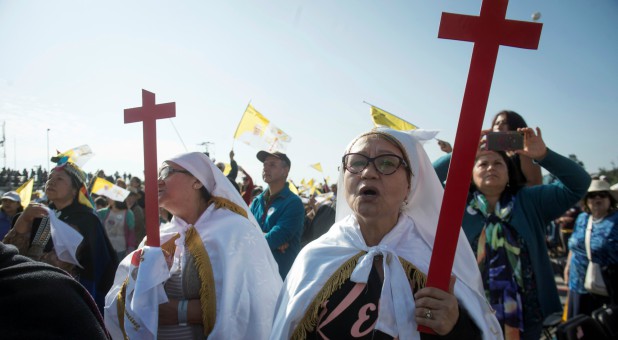Pope Expresses ‘Pain, Shame’ Over Church Sex-Abuse Scandal
Pope Francis expressed “pain and shame” on Tuesday over a sexual abuse scandal in the Catholic Church in Chile, seeking forgiveness for a crisis that has scarred its credibility and left many faithful skeptical of reform.
Francis spoke as the number of Catholic churches that have been attacked in the country in the past week rose to eight, both in the capital and in southern regions that are home to indigenous people.
Police in riot gear dispersed some 200 demonstrators trying to make their way to a park where the pope said Mass for some 400,000 people after making his remarks about abuse.
“Here I feel bound to express my pain and shame at the irreparable damage caused to children by some ministers of the Church,” he said in the presidential palace, drawing sustained applause, including from President Michelle Bachelet and diplomats.
“I am one with my brother bishops, for it is right to ask for forgiveness and make every effort to support the victims, even as we commit ourselves to ensuring that such things do not happen again,” he said.
Catholics have been upset with Francis’ appointment in 2015 of Bishop Juan Barros to head the small diocese of Osorno in south-central Chile.
Barros, who attended Tuesday’s Mass, has been accused of protecting his former mentor, Father Fernando Karadima, who was found guilty in a Vatican investigation in 2011 of abusing teenage boys over many years. Karadima has denied the allegations and Barros said he was unaware of any wrongdoing.
But the scandal has gripped Chile, and, along with growing secularization, has hurt the standing of a Church that defended human rights during the 1973-1990 dictatorship of Augusto Pinochet.
A poll by Santiago-based think tank Latinobarometro this month showed that the number of Chileans calling themselves Catholics fell to 45 percent last year, from 74 percent in 1995.
A group opposed to the pope’s visit posted on Twitter: “No more abuse, no more cover-ups, no more hypocrisy.”
At least eight Catholic churches have been attacked in Chile over the past week, including one with a homemade bomb where vandals left a pamphlet reading: “Pope Francis, the next bomb will be in your robe.”
ANTI-POPE GRAFFITI
Hours after the pope arrived in Chile on Monday, two small wooden churches were burned to the ground near Temuco, where Francis is due to visit on Wednesday.
The indigenous Mapuche in the area accuse the state and private companies of taking their ancestral lands. The Mapuche say the pope’s ceremony will be held on seized land.
A church in the capital was attacked during the night, causing minor damage. Vandals burned Chilean and Vatican flags at the site and tossed pamphlets with threats against the pope.
Graffiti on one Santiago church read “Burn pope and “pope accomplice.”
About 10 blocks from Tuesday’s Mass, riot police clashed with some 200 people protesting against the sexual abuse scandal and the $17 million cost of the papal visit. “Complicit Pedophiles,” read one of the banners.
But the welcome most Chileans have given the first Latin American pope has been warm, with tens of thousands lining the streets.
Francis read the speech in the Moneda palace, which Pinochet’s forces bombed from the air and with ground artillery on Sept. 11, 1973 while democratically elected President Salvatore Allende was inside.
The Argentine pope referred to that dark period, saying the country had “faced moments of turmoil, at times painful.” He praised the consolidation of democracy but said more had to be done to help the unemployed and native people.
Chile, with a population of about 17.4 million, is the world’s top copper producer, the fifth-largest economy in Latin America and one of the region’s most stable countries.
Angelina Soto, 67, of San Francisco de Mostazal, south of Santiago, said she and her family arrived before sunrise for the Mass in the park. “We are very committed Catholics, we’ve been singing all morning,” she said. “I think (the visit) will change Chile, it will make us more generous, and help to close the gap between rich and poor.” {eoa}
© 2018 Thomson Reuters. All rights reserved.














































